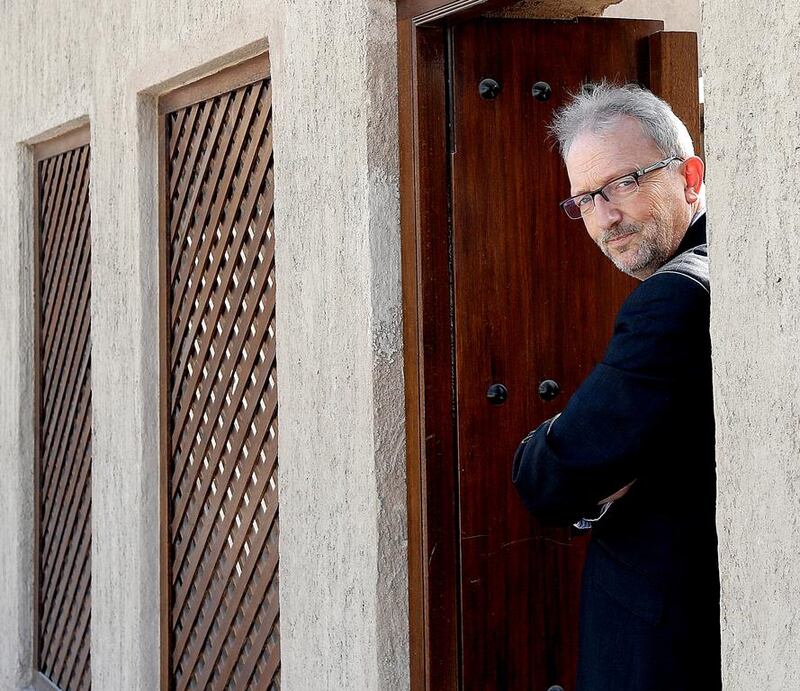Traveller, writer, educated Arabist and noted public speaker, Tim Mackintosh-Smith is a man who wears many hats with ease.
In the UAE as the first writer-in-residence at the new Dubai International Writers' Centre, Mackintosh-Smith has lived in the Yemeni capital Sana'a for more than 30 years, drawing on his studies, wit and personal experiences to offer insights that landed his first book – Yemen: Travels in Dictionary Land – the Thomas Cook / Daily Telegraph Book Award in 1998.
The 53-year-old spent decades following in the footsteps of the 14th-century Moroccan explorer Ibn Battuta and filled a total of 2,990 notepads that finally culminated in the trilogy Travels with a Tangerine, The Hall of a Thousand Columns and Landfalls. The final volume was published in 2010 – a year later Newsweek magazine named Mackintosh-Smith among the 12 finest writers of the past century.
On becoming a writer
“I can remember having fun writing when I was very, very small. I absolutely loved putting words down on paper. My father was a word-conscious person and my paternal grandfather was a poet – there was always poetry and literature in my family and a house full of books. It’s a mixture of nature and nurture, but I would say writing is in the genes.”
On becoming fascinated with the Arab world
“It came again from an interest in words – Arabic is a very meaty language. I recently had dinner with my old Arabic teacher. I said: ‘Remember when you told us the first 30 years were the most difficult?’ He said: ‘Really? I should have said the first 60.’ He’s 80 now.”
On the secret of good travel writing
“Somerset Maugham once said: ‘There are three secrets to [good] writing. Unfortunately nobody knows what they are.’
One of the secrets is hitting the publisher with whatever the zeitgeist is. We’re at a moment where old-fashioned travel writing in the British tradition is a bit out, but if you go into travel memoir there’s more of a market for that. To a certain extent, all travel writing is memoir – it’s as egotistical as autobiography.”
On perceptions of the Arab world in the West
“I started studying the region in the 1970s when there was a huge interest in this part of the world, particularly because of the oil business, and after the crisis in 1973 with the price of oil going up. Suddenly London was full of rich Arabs and people were quite interested in finding out more about them. In a sense, the 1970s were a golden age of the West being interested in the Arab world – since then we’ve slipped into seeing stereotypes rather than what things are like on the ground. Partly because of political Islam and the stereotypes that tends to breed on both sides, westerners don’t tend to look at the Arab world with such a free eye.”
On the Paris attacks
“What might be the silver lining that can come from that terrible incident is that [now] people will look at how to translate culture, in the very widest sense of the word, from both sides. If you switch on the TV you’ve got a lot of Muslims talking about Islam and what it means to them, they have been kick-started into this, which is probably ultimately good. In the same way, the ideals that the French guys were standing for might further inform the Islamic world. It builds up an interchange – it’s when you stop talking that the problems happen. Something such as this has actually made people talk; started up a cultural dialogue.”
On Ibn Battuta, and his relative obscurity in the West
“He’s becoming better known – partly because of my histories. Always what I want to put across about Ibn Battuta is that he’s just an ordinary bloke – he was extraordinary in his feats of travel, but his character was very ordinary, and very flawed. He talks about diarrhoea, about getting ripped off, almost boasts of it in the way a backpacker travelling today might. It’s this that makes him a hero.”
On being invited to Dubai as a writer-in-residence
“I’m deeply honoured – to be the first of anything is always a sort of mark of something. It sounds very noble, but it’s what I hope to give. If you’re giving a talk at a school you see all these faces falling asleep or yawning, but there might be one who is inspired to go into history or writing. And if you’ve inspired one person, you’ve done something.”
Tim Mackintosh-Smith is hosting a Travel Book Group at the Dubai International Writers’ Centre on Wednesday, January 21 at 7pm. For more information, visit
rgarratt@thenational.ae





